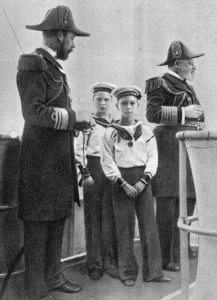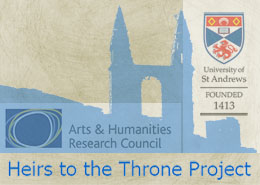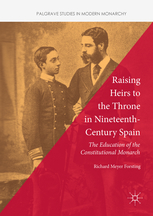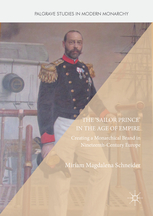Catherine Brice teaches Contemporary History at Université de Paris-Est Créteil. Her research focuses on the cultural and political history of Italy in the 19th century. She has published Architecture et politique à Rome. Le Vittoriano (Rome 1998), Histoire de Rome et des Romains de Napoléon au Jubilé (Paris 2008) and Monarchie et identité nationale en Italie (1861-1900) (Paris 2010). She has directed a funded project on Fraternity as a political concept (2009-2012) and is currently working on the economic aspects of political exile in 19th century Europe.
Christopher Clark teaches Modern European history at the University of Cambridge. His research interests are centred on the history of nineteenth-century Germany and continental Europe. His most recent books are Iron Kingdom. The Rise and Downfall of Prussia, 1600–1947 (London u. a., Allen Lane, 2006), Kaiser Wilhelm II. A life in power (London, Penguin, 2009) and The Sleepwalkers. How Europe went to War in 1914 (London u. a., Allen Lane, 2012).
Ala Creciun received her M.A. from Central European University, Budapest, where her thesis examined the fragmentation of bureaucratic elites at the accession of Alexander III, 1881-1882. Her research interests include nineteenth century discourses and organization of the state in the Russian Empire as well as cultural and ritual practices of autocratic rule and formulation of nation and nationality. In autumn 2013 Ala will enter a doctoral programme in history at the University of Maryland – College Park, where she will focus on the crisis of autocracy in the late Romanov Empire.
Eberhard Fritz has worked as an archivist for the House of Wuerttemberg – a private archive of the former Royal family – since 1987. In 2001 he obtained his PhD from the University of Paderborn with a thesis about Radical Pietism in Wuerttemberg. His research interests have led to many publications on the House and history of Wuerttemberg.
Heather Jones teaches International History at the London School of Economics and Political Science. She is a graduate of Trinity College Dublin where she was a foundation scholar and a Government of Ireland Research Scholar in the Humanities and Social Sciences, and St John’s College, Cambridge. Dr Jones has held a Max Weber Fellowship at the European University Institute, Florence and is a member of the Board of Directors of the Historial de la Grande Guerre, Péronne. Her monograph Violence Against Prisoners of War in the First World War: Britain, France and Germany, 1914-1920 was published by Cambridge University Press in 2011. She is currently researching the British Royal Family in the First World War.
Günther Kronenbitter teaches Modern History and Cultural Anthropology at the University of Augsburg. From 2006 to 2009 he was DAAD Professor of History at Emory University, Atlanta. He specialises in German intellectual history in the 19th century, the history of international relations and military history in the long 19th century as well as the history of the Habsburg monarchy. His dissertation on the conservative Friedrich Gentz was published in 1994, his second book on the politics of the army in Austria-Hungary in 2003.
Richard Kurdiovsky studied art history in Vienna; his thesis focusing on the life and work of the architect Alfred Castellitz (2000), his dissertation on Carl von Hasenauer and Gottfried Semper’s stylistic influence on his oeuvre (2008). Since 2005 he has been a staff member of the Commission for the History of Art (from 2013 onwards Division for History of Art of the Institute for History of Art and Musicology) of the Austrian Academy of Sciences with a focus on the Viennese Hofburg. He is currently an assistant lecturer at the University of Vienna with research interests covering central European architecture, urban history and culture from the Baroque period to the 19th and early 20th centuries.
Katharine Lerman is Senior Lecturer in Modern European History and History course leader at London Metropolitan University. She studied at the University of Sussex and previously taught at the universities of Exeter and Wales (Lampeter). Dr Lerman has written widely on imperial German high politics and political culture. Her publications include The Chancellor as Courtier. Bernhard von Bülow and the Governance of Germany 1900-1909 (Cambridge 1990) and Bismarck (London 2004). She is currently working on a study of women at the Prussian court.
María del Carmen López obtained the Certificado de Aptitud Pedagógica (CAP), the postgraduate degree in Teaching and Pedagogy from the University Camilo José Cela, Madrid. She also holds a Cultural Heritage Master’s programme degree from the University Carlos III, Madrid (Máster Universitario en Herencia Cultural). In her thesis on 1885, año bisagra de las dos restauraciones: el Pacto de El Pardo (= 1885, crucial year of the two restorations: the El Pardo pact) she focused on the succession crisis following the death of Alfonso XII. Currently she is a PhD student at Carlos III University, Madrid. Her research interests lie in contemporary Spanish history, particularly the restoration, reign and court life under María Cristina Habsburgo Lorena.
Lothar Machtan teaches Modern History at the University of Bremen and has published widely on cultural aspects of political history and the history of the aristocracy in 19th and 20th Century Germany. His research also covers relations of history and media, especially historical topics in movies, and biographical writing. Among his recent books are Der Kaisersohn bei Hitler (Hamburg, Hoffmann&Campe, 2006) and Die Abdankung. Wie Deutschlands gekrönte Häupter aus der Geschichte fielen (Berlin, Propyläen, 2008).
Philip Mansel‘s books include a life of Louis XVIII (1981), a study of the court of France 1789-1830 (1989), and histories of Paris between Empires : Monarchy and Revolution 1814-1852 (2001) and of court dress, Dressed to Rule (2005). He is currently writing a life of Louis XIV. He is editor of The Court Historian, journal of the Society for Court Studies (www.courtstudies.org).
Jes Fabricius Møller is an Associate Professor at the history department of the SAXO-institute, University of Copenhagen. He is the author of many articles on cultural history and the following books: På sejrens vej 1999, Biologismer 2003 (PhD thesis), Grundtvigianisme I det 20. århundrede 2005, Caspar Paludan-Müller som historiker (with Mads Mordhorst) 2005 and Hal Koch – en biografi 2009. Currently he is working on a book on the Glücksburg Dynasty. In August 2012 he hosted an international conference on European constitutional monarchies in Copenhagen.
Christoph De Spiegeleer graduated from the History Department at the Free University of Brussels in 2010. His published Master’s thesis explored liberal networks in Brussels in the 19th century, based on an intellectual biography of the Belgian writer/philosopher Charles Potvin. In 2010-2011 he obtained a second Master in the History of Political Culture and National Identities at the University of Leiden, for which he wrote a thesis on practices surrounding the death of socialists in Belgium and the Netherlands. Currently he is working on a doctoral thesis under the auspices of the Flemish Research Foundation (FWO) with the working title The death and commemoration of political elites and members of the Royal Family in Belgium 1830-1940.
Pedro Urbano is a researcher at the Instituto de História Contemporânea (Universidade Nova de Lisboa – Portugal) and the Centro de Estudos Clássicos (Universidade de Lisboa – Portugal). He is currently finishing his PhD studies regarding the Portuguese Royal Household in the last years of the Portuguese Constitutional Monarchy. He has authored a number of publications and participated in several international conferences on the history of the Portuguese aristocracy during the nineteenth century. He also has been granted several research scholarships within different projects.
Valentina Villa has just finished her PhD in History of Political Institutions at the Catholic University of the Sacred Heart in Milan. Her dissertation, which she hopes to publish soon, deals with the British Monarchy after World War II and is based on research carried out at the National Archives during a visiting fellowship at University College London. Her current interests lie in contemporary Italian history, in particular during the Fascist period, and in the history of the Italian and British monarchies.





